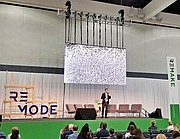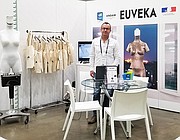MANUFACTURING
Textile Science and Technology Shape the Future of Apparel Manufacturing
Innovations in textile and design are two subjects that go hand in hand with sustainable manufacturing.
At the recent ReMode event at the Los Angeles Convention Center, a Nov. 14 seminar called “Engineering Next-Gen Fabrics” took a look at integrating some new textile innovations with sustainable fashion.
David Breslauer, who is the chief scientific officer and co-founder at Bolt Threads in Emeryville, Calif., discussed how the company is using the new field of biological engineering to “study nature and mimic it.”
“Biology is the most powerful technology on the planet. It reproduces itself, it repairs itself, and it reintegrates itself back into the environment,” he said. “We try to understand nature on the molecular level so we can build upon nature for tomorrow. We are betting that it can free us of our reliance on 19th-century technology.”
One of the most pressing issues that Breslauer cited is the apparel industry’s reliance on man-made, petroleum-based textiles such as polyester, nylon, acrylic and spandex. He explained how Bolt Threads was working toward alternatives to potentially harmful synthetic materials by using solutions such as thread made through a scientific process that mimics the way a garden spider creates silk.
“Every day, she spins fine spider silks that are stronger than steel and able to stretch more than spandex. They’re also biodegradable, antimicrobial and hypoallergenic,” he said. “It’s not just one silk. She makes six different kinds of silk from six different glands in her tiny little body.”
Through learning how to recreate the processes by which the spiders create their silks, he now makes similar threads that will be used to manufacture clothes, which will decompose, eventually providing food for the smallest organisms. Through this technology, Bolt Threads has created fibers that were used to make winter hats and Stella McCartney dresses.
By examining solutions at the design stage, smart-dress-form company Euveka developed its Robot Mannequin—Emineo that expands to large sizes and contracts to the smallest. The French company received the 2018 ReMode Fashion Award for Best Design Technology.
“ReMode is a place to promote ethical fashion in all forms, and we wanted to highlight our innovation to show the global fashion industry that creating clothing to the real size of customers is necessary to limit unsold pieces and extend the life of apparel,” explained Andréa Gilet, the company’s marketing and communications director.
With this technology, Euveka helps to limit textile waste along the supply chain, which supports a more sustainable apparel-manufacturing industry.























